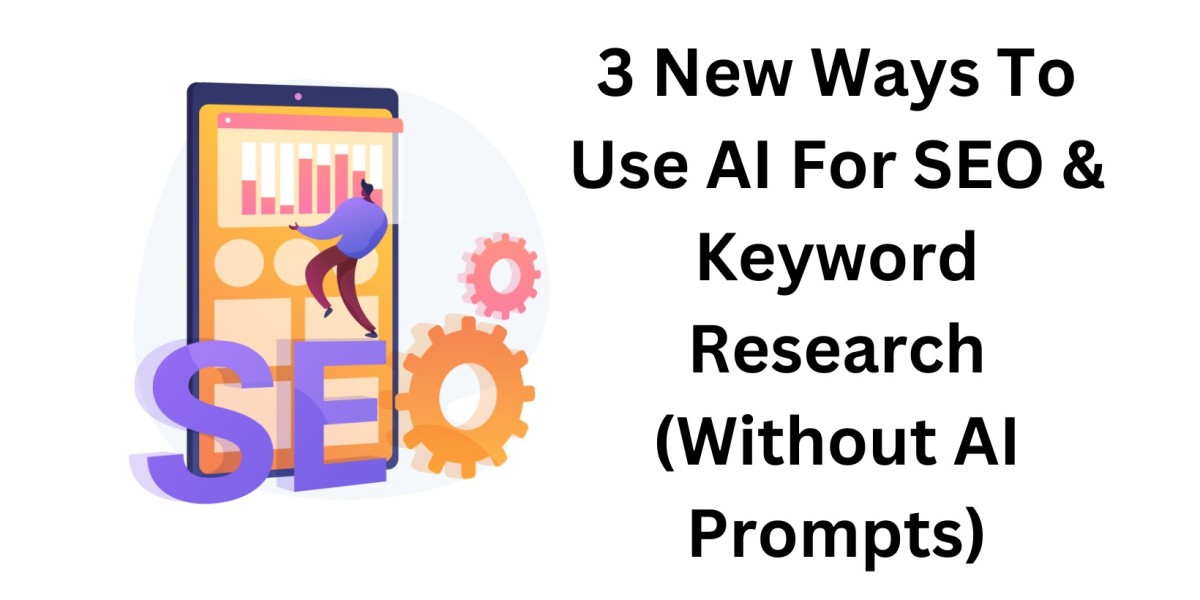Artificial Intelligence (AI) is revolutionizing many fields, and SEO is no exception. With its ability to analyze vast amounts of data and generate insights, AI is becoming an invaluable tool for marketers. Traditionally, AI has been used in SEO through AI-generated prompts and content. However, there are innovative ways to leverage AI for SEO and keyword research that go beyond simple prompts. This article will explore three new ways to use AI for SEO and keyword research without relying on AI prompts.
1. AI-Driven Competitor Analysis
Understanding Competitor SEO Strategies
Competitor analysis is crucial for developing a robust SEO strategy. By understanding what works for your competitors, you can identify opportunities and gaps in your own approach. AI tools can automate and enhance competitor analysis, providing deeper insights than traditional methods.
Automated Site Audits
AI can conduct comprehensive audits of competitor websites, analyzing factors such as:
- Backlink Profiles: Identifying high-quality backlinks that your competitors have acquired.
- Content Analysis: Analyzing the types of content that perform well in your industry.
- Technical SEO: Detecting technical issues and optimizations that improve site performance.
- Keyword Usage: Uncovering the keywords your competitors are ranking for and their strategies for keyword placement.
Tools like Ahrefs, SEMrush, and Moz use AI to provide detailed reports on competitor SEO strategies. These insights help you understand the strengths and weaknesses of your competition, allowing you to refine your own SEO efforts.
Predictive Analytics
AI can use predictive analytics to forecast the impact of different SEO strategies. By analyzing historical data and trends, AI can predict how changes to your website or content will affect your rankings. This helps you make informed decisions and prioritize actions that will have the most significant impact on your SEO performance.
Sentiment Analysis
Understanding how users feel about your competitors' content can provide valuable insights. AI-powered sentiment analysis tools can analyze social media posts, reviews, and comments to gauge public opinion. This information can guide your content creation, helping you address gaps or capitalize on successful strategies that resonate with your target audience.
2. AI-Enhanced Keyword Research
Identifying High-Value Keywords
Keyword research is the cornerstone of SEO. Traditionally, this process involves identifying keywords with high search volume and low competition. AI can enhance keyword research by providing more nuanced insights and uncovering opportunities that might be missed through manual methods.
Natural Language Processing (NLP)
AI tools use Natural Language Processing (NLP) to understand the context and intent behind search queries. This allows them to identify long-tail keywords and phrases that are highly relevant to your audience but may have lower competition. By targeting these keywords, you can attract more qualified traffic to your site.
Semantic Search
AI-powered tools can analyze semantic relationships between keywords, providing a more comprehensive understanding of how users search for information. This helps you identify related keywords and phrases that can enhance your content's relevance and improve your chances of ranking for multiple search terms.
Real-Time Keyword Trends
AI can analyze real-time data to identify emerging keyword trends. By staying on top of these trends, you can create timely content that addresses current topics and captures the attention of your audience. Tools like Google Trends and AnswerThePublic use AI to provide insights into trending keywords and topics.
Competitor Keyword Gaps
AI can identify keyword gaps by analyzing the keywords your competitors are ranking for that you are not. By targeting these gaps, you can improve your visibility and capture traffic that your competitors are missing. This approach helps you identify untapped opportunities and expand your keyword strategy.
3. AI-Driven Content Optimization
Enhancing Content Quality
High-quality content is essential for SEO success. AI tools can help you optimize your content for search engines and improve its overall quality. This goes beyond simple keyword placement, focusing on creating content that is informative, engaging, and valuable to your audience.
Content Analysis and Recommendations
AI-powered content analysis tools can evaluate your existing content and provide recommendations for improvement. This includes:
- Readability: Ensuring your content is easy to read and understand.
- Keyword Optimization: Identifying opportunities to incorporate relevant keywords naturally.
- Engagement: Analyzing user engagement metrics to determine which types of content resonate with your audience.
- Content Gaps: Identifying topics or questions that your content does not currently address.
Tools like Clearscope, MarketMuse, and SurferSEO use AI to provide actionable insights that help you optimize your content for both search engines and users.
Content Generation and Personalization
While AI-generated content has limitations, AI can assist in generating ideas and structuring content. AI tools can suggest topics, headlines, and outlines based on keyword research and competitor analysis. This helps you create content that is relevant and optimized from the start.
AI can also personalize content based on user behavior and preferences. By analyzing data such as past interactions, demographics, and interests, AI can tailor content recommendations to individual users. This personalized approach can improve user engagement and increase the likelihood of conversions.
Visual Content Optimization
Visual content, such as images and videos, plays a significant role in SEO. AI tools can optimize visual content by:
- Image Recognition: Automatically tagging and categorizing images based on their content.
- Video Analysis: Analyzing video content to identify key themes and optimize metadata.
- Alt Text Suggestions: Generating descriptive alt text for images to improve accessibility and SEO.
By optimizing visual content, you can enhance user experience and improve your search engine rankings.
The Future of AI in SEO
Voice Search Optimization
As voice search continues to grow in popularity, optimizing for voice queries is becoming increasingly important. AI tools can help you understand how users phrase voice search queries and identify opportunities to optimize your content for these types of searches.
AI-Powered SEO Tools
The development of AI-powered SEO tools is accelerating, providing marketers with more advanced capabilities and insights. These tools will continue to evolve, offering new ways to enhance your SEO strategy and stay ahead of the competition.
AI and User Experience (UX)
User experience is a critical factor in SEO, and AI can play a significant role in optimizing UX. By analyzing user behavior, AI can identify areas for improvement and provide recommendations to enhance site navigation, layout, and overall usability.
Conclusion
AI is transforming the way we approach SEO and keyword research. By leveraging AI-driven competitor analysis, AI-enhanced keyword research, and AI-driven content optimization, you can develop a more effective SEO strategy and drive more traffic to your site. As AI technology continues to evolve, its applications in SEO will expand, providing even more opportunities to optimize your online presence.
For those looking to maximize their SEO efforts, partnering with an organic SEO agency company can provide additional expertise and resources to achieve your goals.



